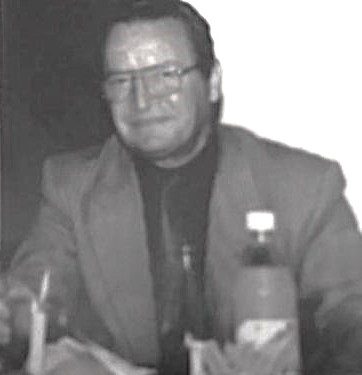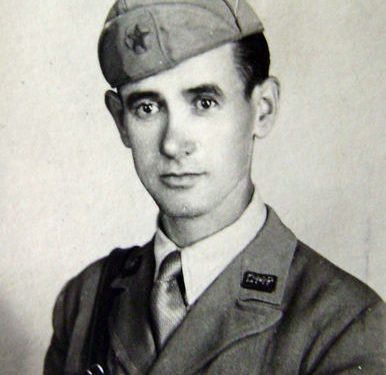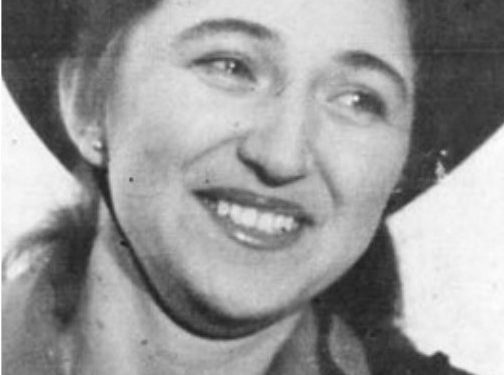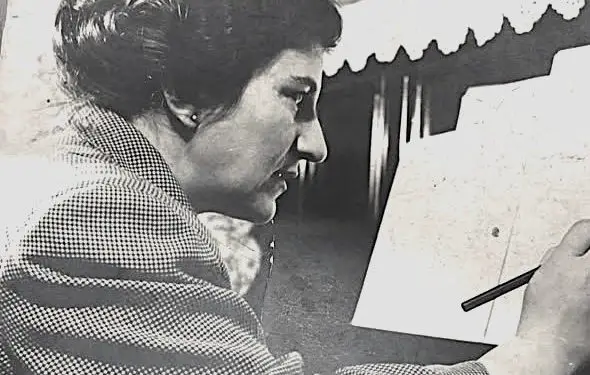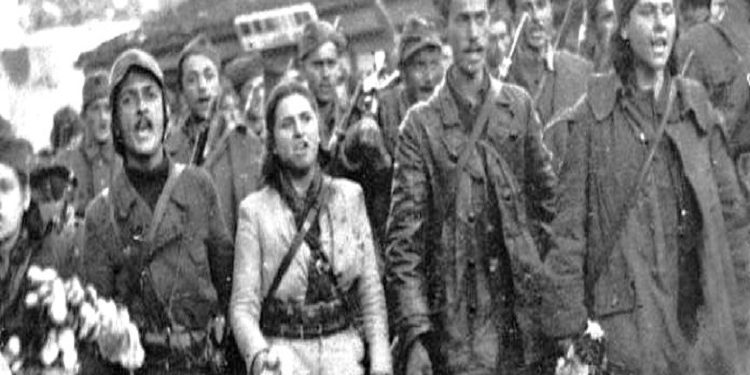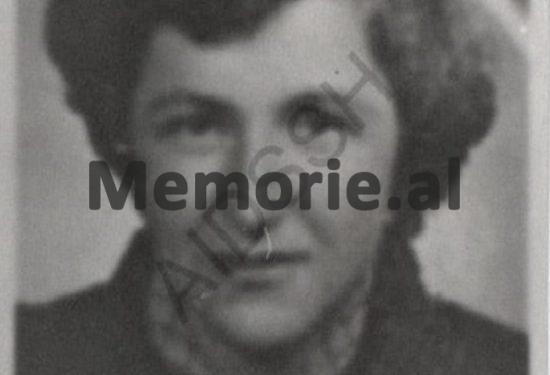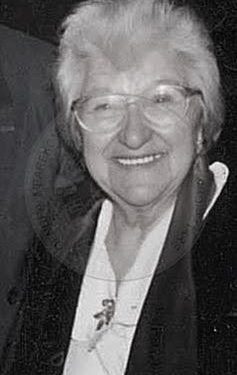From Prof. Assoc. Dr. Gjergj P. Titani
Part Four
Memorie.al / In this article, we are publishing a long interview with the “People’s Artist” and “Grand Master of Work,” the distinguished composer Dhora Leka. The conversation with her began a long time ago, but almost nothing was published because her wish was to finish her memoirs, compiling them into a special book titled; “Moments and Impressions from My Life.” The book has been revised several times and has been cross-referenced with both archival documents and her family’s personal archive. Today we are publishing the first presentation with the distinguished composer, which will continue for several issues.
Continues from the previous issue
THE FAMOUS ARTIST WHO WAS SENTENCED TO DEATH
For how long did you repeat your verses and when were they published?
During all the time of my imprisonment, for over seven years, almost every night before I fell asleep, I fanatically repeated this ritual, even though they kept adding up. And only after my release from this “tomb” could I give them life, and along with the verses, I compiled them into the volume “Songs in the Storm” during my internment. I modestly say that these verses are a kind of twin to the book: “Songs of the War for Freedom,” which were woven during the partisan war.
Mrs. Dhora, did you serve all the years of your sentence in prison?
Certainly not. Fate had it that I did not suffer all the years of the sentence decided by the “dossier,” which I never knew what it contained and I regret that I didn’t get to know it, because there is still no law for opening dossiers. What amazes me, as I said above, is where these “dossier-keepers” fish out these materials?! In those years that I was serving my sentence, I was lucky to benefit from a large reduction of the sentence from the amnesties made in November of 1957, 1959, and 1962.
In addition to the amnesties, I had also earned a sentence reduction of 3 years and six months from the work I had done and exceeding the daily norm, so in total, there were still 2-3 years left to serve. After a court hearing for a pardon, which I don’t know where it came from as a gift to me, according to the decision of the Tirana Court, I was released on parole in November 1963. The condition was: “I would be given a maximum sentence in case of repeating the crime,” and this was nothing else but that I would again be a target.
How did you experience the moment of your release from prison?
Although I was pardoned by the head of the Tirana Court, the communication of my conditional release, when they told me: “You have been released!” Of course, it was unexpected. It was a long-awaited and emotional moment, and I suddenly asked: “But where should I go?” – “Wherever you want,” he said with indifference. I ran down the stairs. My heart was beating fast. It seemed strange to me how the police weren’t following me and my hands were not tied.
I breathed freely. I held my breath at the Central Artisan Workshop. I asked the guard to meet the commander of the Workshop, Vangjel Rëmbeci, who was also in charge of the Workshop. In one breath, I told him the court’s decision. He seemed to have been notified of the decision; he provided me with a release form and directed me to the Department of Internal Affairs in Tirana.
They brought out my few personal belongings, a “chicken” of clothes as they say, and I held my breath at the Department of Internal Affairs which was still at “Selvia.” They officially provided me with the release form there as well. With the release form in hand, I went to the “Donika” hotel. There, they asked me for my identity document and I presented the document of my release from prison, but they told me: “There’s no room, comrade!”
I ran back to “Selvia,” and told them: – “At the ‘Donika’ hotel where I presented myself, they didn’t accept me.” He picked up the phone, I don’t know who he spoke to, and he told me flatly: – “Go, go to ‘Donika,’ a place has been found.” After I settled into a room at the hotel, the desire that took over me was to see my mother as soon as possible. She lived in the Lana apartment buildings, in an entrance with my older brother Petro. Touching moments. I knocked on the door but no one answered, I pushed it, entered the hallway, and yelled: “Mother, oh mother!”
I feel like I’m reliving that moment even now: “Mother, dear mother,” and our hands reached out and embraced. I couldn’t hold back the tears, nor could she. After she swallowed, she said: “Thank goodness, my daughter that we made it to this day!” And she swallowed again and finally, shaken, she told me: “You can’t live here, you can’t sleep. My son told me that he is a Party member and we have to understand this situation. You can’t live in this house, so we will harden our hearts.”
“Don’t be sad, mother,” I said, and I headed back to the hotel. After a few days, the “competent authorities” informed me that I had been assigned to go and live in Berat. My stay in Berat was permitted with limited movement within Berat, so, not internment, but with limited movement within Berat! A specific variant of internment. Before I left for Berat, my mother came and met me at the hotel; I told her that they had assigned me to go to Berat.
Our joy was twofold, because my sister Mita Jakova had been living in Berat since July 1955, with her four young orphan children. When I arrived in Berat at the bus station, I saw a little girl who ran towards me and threw her arms around my neck: – “I’m Bujana, Aunt Dhora!” How much she had grown, how beautiful she had become! On the way home she kept repeating: “How happy mom, Gimi, Niku, Vjosa will be, how happy I will be! You’ll stay with us! Oh, how fun!” and I could not contain my emotion, my joy.
Mrs. Dhora, was the family of the former Prime Minister, Tuk Jakova, still in Berat?
My sister’s family, yes. My sister’s family continued to live in the same single-story house where I had accompanied them on June 23, 1955. Of course, this time it was very clean, even though the furnishings were very modest. My sister had also prepared the table for lunch. We hugged with longing, barely holding back our sobs. We had so much to talk about to each other. For nights on end, each one described the calvary of their own painful odyssey.
After a few days, our mother came; she had decided to live with us. Life was very difficult, there were seven of us. I absolutely had to find a job and the job was found: at the Collection Enterprise, to mend sacks that were loaded with wheat. Since we were very cramped, I asked for a place to live, and after many difficulties, finally, a room was found in an old house, where I lived with my mother.
But, my dream was, that in the days of isolation in the cell I wished to write an opera. I needed a piano. When I expressed this desire to my mother, she told me: – “Alright, my daughter, we’ll buy a piano, I know your soul won’t rest. Your mother has collected some money like an abscess, which I’ve saved for death expenses. I didn’t want to burden anyone. I won’t die tomorrow and your mother has the money. Take it and buy the piano.”
So I began to work in the evenings after my hard labor, to realize this dream. The piano alone was not enough for this; the libretto had to be written first. For this, I needed to get in touch with some poet to help me. But the doors were closed to me, starting with the League of Writers and Artists. I continued to write verses, but I had never tried opera librettos.
And, this was unjustified; to meet me was like meeting a leper. The shadow of the Security Service was present everywhere. A shadow that made people feels insecure. How often we repeated the expression in those years of dictatorship: “Don’t even trust your own skin!” This made people repressed. And I hold no grudge against anyone who didn’t come to my aid when I needed it so much. Each person feels and knows where their own house leaks.
What did you do to achieve your dream?
I happened to meet Ismail Hoxha in Tirana; we had been fellow students in Moscow. He was the Director of Culture at the Ministry of Education and when I expressed my desire and the obstacles to realizing the opera “Autumn with a Storm,” especially regarding the libretto, he told me: – “But you, Dhora, why are you struggling all the way to Tirana? In Berat, you have Ismail Kadare, talk to him, and tell him from me too to help you.”
And the days followed one after another. I have written some verses that have a painful history titled “The Undefeated” (Monument), just listen: “THE UNDEFEATED” (Monument)
“With my nails I try / a Monument / “The Undefeated” to carve… / The Tyrant see it / raise the whip / Shouts: / No. This can never happen / never / better to die! / But I: / I arch my back, / clench my teeth / under the whip / more determined / a Monument / “The Undefeated” / I try / to carve… / The Tyrant shrieks in terror / from the “echo” that is thrown back / a challenge in his face: / No. This can never happen, / never, better to die”!
Meanwhile, I continued to work to write the libretto and the music. I wanted to write it at all costs. And I decided to ask the director of the enterprise to give me three days off from work, without pay, despite the great economic difficulties. My mother and I lived on the minimum of life’s expenses, only for bread, water, and salt.
The events that followed are painful and happened completely unexpectedly, so much so that even today I am unable to explain them. I found myself in a large hall full of activists of the Democratic Front. On the presidium of the meeting, at a table covered with a red cloth, stood the dignified First Secretary for Berat, Piro Gusho, who was also later accused with the “oil sabotage group” and committed suicide. (But he could not face the situation and killed himself.)
The head of the neighborhood council had notified me that I had to attend this meeting. His insistence surprised me. He even reminded me before the meeting that I absolutely had to be there. The chairman said everything and nothing in that shameful presentation, and I felt how uncomfortable Ismail was. Had they taken him as a facade?! Had they forced him, like me, to be present in the hall?!
Years later, I even wrote to the former chairman of the Presidium of the People’s Assembly, Ramiz Alia, telling him that: – “No citizen of the People’s Republic of Albania had been subjected to such a massive discrimination.” I bring to your memory, it was the time of the Cultural Revolution in China and the dacibaos had begun to fill the facades of our buildings in Albania as well.
They put me in front of the crowd that was hysterically shouting: “To prison, to prison, incorrigible enemy, traitor, sold out.” This crowd in hysterical ecstasy accompanied me to the Department of Internal Affairs. (The people of the city of Berat also experienced this with pain, and they remember it today; there are eyewitnesses who can describe it.)
The Head of the Internal Affairs Department, who was named Siri (I don’t remember the last name), gave the order and they locked me in a dark cell. To protest, I went on a hunger strike. The next day I asked for an explanation for this whole shameful scene. – “We will release you,” said the delegate, but I don’t know from whom. He repeated: – “We will release you, but on the condition that you accept what was said at the Conference.”
-“Never ever,” was my firm answer. After a few hours, they took me out of the cell, put me in the “Gaz” of the Internal Affairs Department, and took me home. My mother had waited for me all night, terrified. – “Take clothes for sleeping,” the Department employee ordered me. When I entered the room to get some clothes for sleeping, I quickly lifted the piano lid, grabbed the verses that I always kept folded from the corner of the keyboard, and put them in my mother’s bosom, while hugging her. I got into the “Gaz.” I didn’t know the direction it would take; it was an enigma to me. Where would they take me, I wondered?!…
Mrs. Dhora, what happened to you afterward?
The “Gaz” of the Department of Internal Affairs departed. All along the way, I tried to solve the enigma. Where were they taking me?! The territory where the “Gaz” was going was unknown to me. After a few hours of travel, we arrived in an unfamiliar city. The car stopped. The escort got out of the car and told me: – “Wait here for a moment.”
Now I realized that I was at the entrance of the Department of Internal Affairs in Fier, as I learned a little later when the escort returned. He got back in the car, which again set off. I was again asking myself; “Where are they taking me, I wonder”?! After a while, the first houses of a lowland village appeared, and I immediately noticed some barracks across from an unplastered multi-story building. When the car stopped, the plenipotentiary of the area appeared.
-“I brought her to you,” my escort told the plenipotentiary of the Department of Internal Affairs in Fier. Then we entered a small office, where the head of the sector was also present. It was here that I fully understood that I was in the sector of the agricultural farm New Seman, where I was officially informed that I had been sentenced to 5 years of internment and after this; they took me to the place where I would live. When the Department’s “Gaz” stopped in front of the wooden barracks, which were lined up one after another, a crowd of people of all ages, and of all kinds appeared, not excluding small children.
-“Oh, they’ve come, new people have come, and they’re bringing more again.” I later got used to this common ritual, whenever they brought new internees. I experienced this kind of painful ritual who knows how many times, during my stay there in the sector. They assigned me to live with a woman who kindly helped me settle into that dilapidated ground-floor shack, if I can call it a room. After she put her arms around my neck, she said: – “My name is Xhina, what about you?” – “Dhora” – I said.
-“Don’t worry,” she told me, “because all of us have come in the same condition that you are in today. We are good people, even though they have sentenced us. Oh, Dhora! What your ears will hear here. Wait, just wait and you’ll see.” This is what truly happened; I saw and heard a lot of pain and tragedy, which goes beyond the limits of this long interview.
What are some of your impressions of this internment camp?
The first day of work left an indelible impression on me. I was assigned to a work brigade with Xhina. The type of work was thinning out the sprouted wheat. But that’s not what’s important. What impressed me was the immeasurable space of Myzeqe, the lush greenery, the clean air that filled my lungs. The first break when we sat down to have lunch, with what each one had brought in their bag. Cornbread or wheat bread, onions, garlic, cottage cheese, buttermilk that we moistened our parched lips with, because that place had no drinking water.
The farm sector was supplied with water that was brought from time to time by water tankers. When the water truck came, oh my, all hell broke loose, everyone tried to fill a container with drinking water. I also had to work on all kinds of different jobs. Digging canals, hoeing, harvesting, picking cotton, beans, husking corn, etc. Whenever I remember the corn or the bread, a tragic episode comes to mind.
Here’s how: – In the corn cribs where we were husking, thousands of corn moths buzzed, and they never left us for a moment. They, along with the corn, were ground and the flour for bread was cooked with them. This bread was sold to us and to the villagers of the sector. I want to emphasize that, after their release, the former convicts remained as permanent residents of this sector, which kept growing and growing! / Memorie.al
Continues in the next issue





